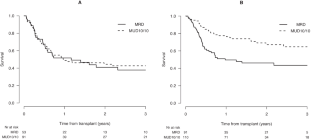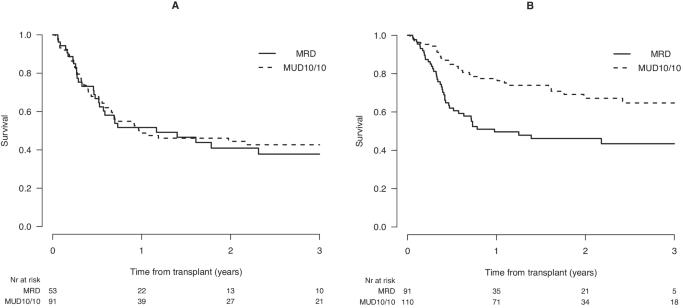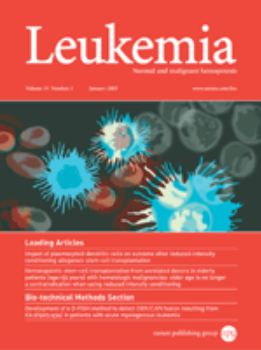Older MRD vs. younger MUD in patients older than 50 years with AML in remission using post-transplant cyclophosphamide
IF 12.8
1区 医学
Q1 HEMATOLOGY
引用次数: 0
Abstract
An increasing number of older patients with acute myeloid leukemia (AML) are offered an allogeneic hematopoietic stem cell transplantation (allo-HSCT). Normally, older patients have older matched related donors (MRD). Matched unrelated donors (MUD) are an important alternative, but it remains unclear whether a younger MUD is associated with better outcomes, especially in the context of post-transplant cyclophosphamide (PTCy). We compared outcomes of patients older than 50 years with AML in first complete remission (CR1) and receiving a first HSCT from a 10/10 MUD aged younger than 40 years to those receiving a graft from a MRD aged older than 50 years, using PTCy and with well-known transplant conditioning intensity (TCI) score. A total of 345 consecutive patients were included and classified according to TCI score as low, intermediate, or high. On multivariable analysis in the TCI-intermediate/high group, MUD was associated with better graft-versus-host disease-free, relapse-free survival, lower non-relapse mortality and lower relapse incidence. For patients receiving a TCI-low regimen, outcomes are independent on the type of donor. In patients with AML in CR1, older than 50 years and receiving a TCI-intermediate/high conditioning regimen using PTCy, a MUD younger than 40 years is preferable over a MRD older than 50 years.


50 岁以上使用移植后环磷酰胺的急性髓细胞白血病缓解期患者中年龄较大的 MRD 与年龄较小的 MUD 的对比。
越来越多的老年急性髓性白血病(AML)患者接受异基因造血干细胞移植(allo-HSCT)。通常情况下,老年患者的配型亲属捐献者(MRD)年龄较大。匹配的非亲属供者(MUD)是一个重要的替代选择,但目前仍不清楚年轻的MUD是否与更好的预后有关,尤其是在移植后使用环磷酰胺(PTCy)的情况下。我们比较了50岁以上首次完全缓解(CR1)的急性髓细胞性白血病患者与接受10/10 MUD移植的首次造血干细胞移植患者的预后,前者年龄小于40岁,后者年龄大于50岁。共纳入了 345 名连续患者,并根据 TCI 评分分为低、中、高三级。对TCI中/高组进行多变量分析后发现,MUD与较好的无移植物抗宿主疾病生存率、无复发生存率、较低的非复发死亡率和较低的复发率相关。对于接受 TCI 低方案治疗的患者,治疗结果与供体类型无关。对于年龄大于 50 岁、CR1 期的急性髓细胞白血病患者,在接受 TCI 中/高调理方案并使用 PTCy 时,MUD 年龄小于 40 岁比 MRD 年龄大于 50 岁更可取。
本文章由计算机程序翻译,如有差异,请以英文原文为准。
求助全文
约1分钟内获得全文
求助全文
来源期刊

Leukemia
医学-血液学
CiteScore
18.10
自引率
3.50%
发文量
270
审稿时长
3-6 weeks
期刊介绍:
Title: Leukemia
Journal Overview:
Publishes high-quality, peer-reviewed research
Covers all aspects of research and treatment of leukemia and allied diseases
Includes studies of normal hemopoiesis due to comparative relevance
Topics of Interest:
Oncogenes
Growth factors
Stem cells
Leukemia genomics
Cell cycle
Signal transduction
Molecular targets for therapy
And more
Content Types:
Original research articles
Reviews
Letters
Correspondence
Comments elaborating on significant advances and covering topical issues
 求助内容:
求助内容: 应助结果提醒方式:
应助结果提醒方式:


